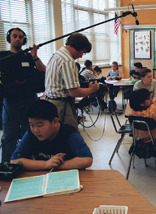| Science Media Group | In Production | |||
|
Education Research  Dyslexia and Science (2007)
Dyslexia and Science (2007)
We are investigating under a grant from NSF a hypothesis that people with dyslexia, because of differences in neurology, may be predisposed to certain forms of visual processing that are useful in science, specifically looking at how dyslexia affects abilities of astronomers to analyze image-processed data.
 MOSART Web Site (2006)
MOSART Web Site (2006)
Project MOSART intends to enhance the quality of K-12 science teaching and aid in generating evidence-based outcomes of learning through the development of comprehensive subject matter assessment tools. The Web site was created to enhance communication and collaboration between partners within the MOSART project as well as to inform the public of the efforts of the Math and Science Partnership Program.
 FICSS Web Site (2005)
FICSS Web Site (2005)
Relationships between the decisions that high school science teachers and their students make affect the success of students in their introductory college science courses. FICSS developed surveys that characterize students' choices of high school science courses taken and teachers' choices about pedagogy and curricula in these courses. This interactive, video-based Web site communicates the results of the survey given to 18,000 students.
 Understandings of Consequence (2005)
Understandings of Consequence (2005)
Web site and DVD providing professional development for educators using the Understandings of Consequence curricula in their classrooms.
 Harvard-Smithsonian Digital Video Library (2003)
Harvard-Smithsonian Digital Video Library (2003)
This collection of video clips provides more than 350 hours of digital video material, archived in digital form and indexed through a searchable database; the collection is linked to local, state, and national STEM standards.
 Surprises in Mind (2001)
Surprises in Mind (2001)
A remarkable 12-year study following students from first grade through high school demonstrates the brain's surprising natural abilities for learning math. The study, led by Professor Carolyn Maher of Rutgers University, brought results that are corroborated by new research from leading cognitive psychologists. Discover ways to unlock this natural human gift for mathematics in classrooms, workplaces, and homes.
|
Chemistry for the 21st Century An on-line introductory course that humanizes and demystifies chemistry through 13 half-hour video programs, on-line text, and interactive labs. | |||




